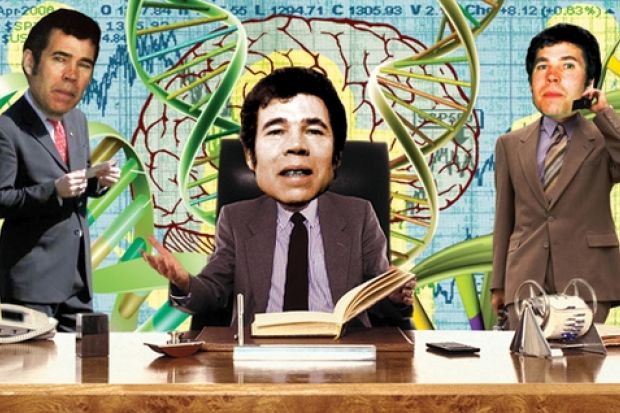Was it a coincidence that Are You Good or Evil? (Horizon, BBC One, Wednesday 7 September, 9pm) was sandwiched between part one and part two of Appropriate Adult (ITV One, Sunday 4 September and Sunday 11 September, 9pm)? The first looked at what made a psychopath, the second gave us a portrait of serial killer Fred West's relationship with Janet Leach, his "appropriate adult", the term for a parent, guardian or social worker who must be present when a young or vulnerable person is questioned in police custody.
According to Professor Robert Hare of Columbia University, the typical psychopath has a number of traits, chief of which is a total lack of empathy for others. He also found that psychopaths have a blunted response to language. They do not react to emotive words like "rape" but register them as they would a neutral word such as "cup". With a bit of fine tuning, this could be used as a justification for the study of literature; a failure to register the subtleties of a Hardy lyric and you will be locked away as a danger to the public.
One of the most startling revelations came from Dr Paul Babiak who claimed that there are four times as many psychopaths in business as there are in the general population. Well, that certainly throws a new light on the financial crisis, doesn't it? The psychopath has exactly the qualities that leaders of big organisations need: the ability to communicate, charm, manipulate and intimidate. Psychopaths are thrill-seekers and the permanent revolution of the corporate world satisfies that craving. And although they don't get to kill people, they do at least get to make them redundant or repossess their homes. It's not the same, of course, but they don't go to prison and they get a bonus.
A lot of work has been done on the chemical profile of the psychopath. He or she is likely to have a mutated version of the gene carrying the enzyme monoamine oxidase A (MAO-A). It's called the "warrior gene", which seems a rather romantic way to describe a condition that can make a person take up necrophilia. Professor James Fallon has identified damage to the orbital cortex and part of the temporal lobe as two further factors in the physical make-up of the psychopath. He was alarmed to discover both impairments in his own brain. His son loyally said he wasn't surprised. The professor, his eyes flicking from side to side, was sure he hadn't killed anybody. Why not? Because he had had a happy childhood. A genetic accident and faulty circuitry are not, by themselves, sufficient to morph a person into the next Fred West.
George Moore, based on the philosopher G.E. Moore, is a character in Tom Stoppard's Jumpers (1972). He wants to know what is meant by saying that one action is better than another, "not more useful, or more convenient, or more popular, but simply pointlessly better". It's the sort of ethical question that Horizon dodged, perhaps wisely. But without some sort of probing of the notions of "good" and "evil", then we are trapped in the logic that states that, if there is a chemical basis to behaviour, then it can be measured and "manipulated", a word that had acquired a certain resonance by the end of the hour.
Neil McKay used it to defend his film about Fred West. "What I would say is that people would watch Appropriate Adult and be more conscious of the way manipulators work." And West, on the basis of this film, was a supreme manipulator. He made Janet, played by Emily Watson, feel that she was special to him, that he could confide in her, that he could rely on her. He would refuse to answer questions unless she was there, he would ring her at home and, a brilliant detail this, she would eventually close the door on her family so that she could speak to him more freely. Dominic West was beguiling as his namesake but you couldn't help wondering whether a tall, Eton-educated man was the best choice for the role of a short, barely literate odd-job man who lived in a house where incest and murder were commonplace. There were no such reservations about Emily Watson's performance. She was utterly credible as a well-meaning woman who becomes horribly confused by her contact with West. This was more than the corruption of decency. This was an involuntary quickening at the glimpse of the dark side. Monica Dolan as Mrs West had few words and most of those began with "f". She had a gimlet eye and an indomitable will. You could imagine flowers shrivelling in her wake. And her called Rose.
In the end, Mr McKay's rationale for his film is evasive. It doesn't answer the real question: why good people should want to watch it.
Register to continue
Why register?
- Registration is free and only takes a moment
- Once registered, you can read 3 articles a month
- Sign up for our newsletter
Subscribe
Or subscribe for unlimited access to:
- Unlimited access to news, views, insights & reviews
- Digital editions
- Digital access to THE’s university and college rankings analysis
Already registered or a current subscriber?
